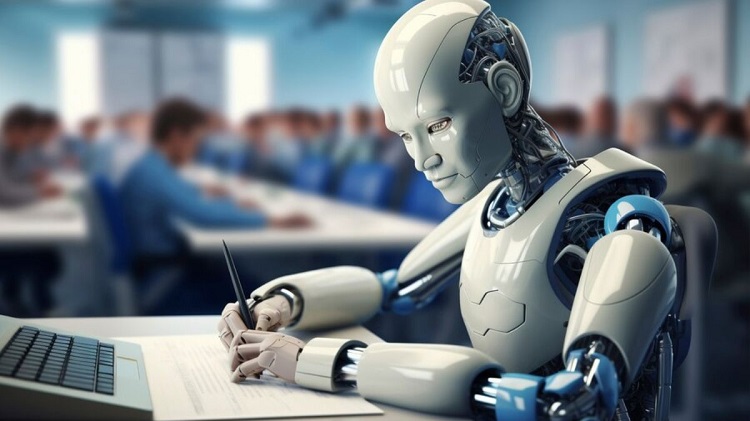1. The Role of AI in Decision-Making and Global Challenges:
Artificial Intelligence (AI) has become a transformative force in various fields, challenging traditional notions and reshaping industries. Recognizing the significance of AI and its ethical implications, UNESCO produced the first-ever global standard on AI ethics – the ‘Recommendation on the Ethics of Artificial Intelligence’ in November 2021[1]. This framework, adopted by all 193 Member States, emphasizes the protection of human rights and dignity as the cornerstone of AI ethics. As AI continues to advance rapidly, it is crucial to understand its implications and ensure responsible development and deployment.
Body:
1. The Role of AI in Decision-Making and Global Challenges:
AI is playing a pivotal role in supporting decision-making processes for governments and the private sector[2]. By analyzing vast amounts of data and providing valuable insights, AI systems assist in making informed choices that can lead to more effective policies and strategies. Moreover, AI is being leveraged to address global challenges such as climate change and world hunger[2]. With its ability to process and analyze complex data sets, AI can contribute to finding innovative solutions to these pressing issues.
However, while AI offers immense potential, it also raises concerns regarding ethics and human rights. UNESCO’s Recommendation on the Ethics of Artificial Intelligence aims to address these concerns and ensure that AI development aligns with fundamental principles[1]. By emphasizing the protection of human rights and dignity, this global standard seeks to guide policymakers, developers, and users of AI systems in making ethical choices.
2. UNESCO’s Work on AI:
UNESCO has been actively involved in various aspects of AI, including standard setting, policy advice, and capacity building[3]. The organization has launched guidance for policymakers in AI and education, recognizing the transformative impact of AI on learning environments. By providing recommendations on integrating AI into educational practices while upholding human rights and ethical considerations, UNESCO aims to promote responsible AI use in educational settings.
Additionally, UNESCO has developed training programs for youth on AI and human rights. Recognizing the importance of empowering the younger generation with AI literacy and ethical awareness, these initiatives equip young people with the necessary skills to navigate the AI-driven world responsibly. Furthermore, in 2022, UNESCO plans to train over 2,000 judicial operators worldwide on AI and the rule of law[3]. This training program aims to enhance the understanding of AI’s legal implications among judicial professionals, ensuring fair and just decision-making in cases involving AI systems.
3. The Transformative Impact of AI:
The rapid advancements in AI, along with other emerging technologies such as robotics, cloud computing, and the Internet of Things, are transforming disciplines, economies, and industries[4]. AI’s ability to automate tasks, analyze vast amounts of data, and make predictions has led to significant improvements in various sectors, including healthcare, finance, transportation, and manufacturing. These advancements have the potential to enhance efficiency, productivity, and innovation.
However, the transformative impact of AI also raises concerns about job displacement and inequality. As AI systems automate certain tasks, there is a need for reskilling and upskilling the workforce to adapt to the changing job market. Additionally, ensuring equitable access to AI technologies and addressing biases in AI algorithms are crucial to prevent exacerbating existing inequalities.
4. The Need for Ethical AI Development:
As AI continues to evolve and permeate various aspects of society, it is essential to prioritize ethical considerations in its development and deployment. UNESCO’s Recommendation on the Ethics of Artificial Intelligence provides a comprehensive framework for responsible AI development. By emphasizing human rights, dignity, and the rule of law, this global standard guides stakeholders in making ethical choices throughout the AI lifecycle.
Ethical AI development requires transparency, accountability, and inclusivity. Developers must ensure that AI systems are explainable, allowing users to understand how decisions are made. Additionally, mechanisms for accountability and redress should be in place to address potential biases or discriminatory outcomes of AI systems. Moreover, involving diverse perspectives and stakeholders in AI development processes can help mitigate biases and ensure that AI technologies serve the common good.
Conclusion:
Artificial Intelligence is transforming various disciplines, economies, and industries, offering immense potential for societal progress. However, it is crucial to navigate the ethical implications of AI development and deployment. UNESCO’s Recommendation on the Ethics of Artificial Intelligence provides a global standard that emphasizes the protection of human rights and dignity. By following this framework and prioritizing transparency, accountability, and inclusivity, stakeholders can ensure responsible AI development that benefits society as a whole.





